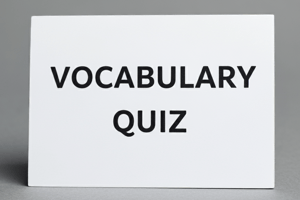Podcast
Questions and Answers
An organization is aiming to launch a new line of sustainable products. They have several ongoing projects related to eco-friendly packaging, ethical sourcing, and carbon footprint reduction. Which of the following best describes this collection of initiatives?
An organization is aiming to launch a new line of sustainable products. They have several ongoing projects related to eco-friendly packaging, ethical sourcing, and carbon footprint reduction. Which of the following best describes this collection of initiatives?
- A project portfolio, as it encompasses various projects aligned with a strategic goal.
- An outcome, representing the ultimate aim of becoming a sustainable organization.
- A product, specifically the new line of sustainable products being launched.
- A program, focused on coordinating related projects to achieve a combined benefit in sustainability. (correct)
Which of the following scenarios exemplifies the primary role of 'governance' in project management?
Which of the following scenarios exemplifies the primary role of 'governance' in project management?
- A project sponsor approves the initial project charter and scope statement.
- A steering committee reviews project progress against strategic objectives and decides to reallocate budget to ensure alignment. (correct)
- A project manager uses a Gantt chart to track project timelines and task dependencies.
- A project team holds daily stand-up meetings to discuss task completion and roadblocks.
A project team is encountering resistance from end-users regarding a new software implementation. To address this, which 'people-powering projects' function should be prioritized?
A project team is encountering resistance from end-users regarding a new software implementation. To address this, which 'people-powering projects' function should be prioritized?
- Provide Oversight and Coordination to streamline the rollout process.
- Provide Resources and Direction to allocate more training materials for end-users.
- Perform Work and Contribute Insights to enhance the software's technical features.
- Present Objectives and Feedback to gather user concerns and refine the software. (correct)
A construction project is delayed due to unexpected heavy rainfall, which is impacting material delivery and on-site work. This weather condition is best categorized as which type of factor?
A construction project is delayed due to unexpected heavy rainfall, which is impacting material delivery and on-site work. This weather condition is best categorized as which type of factor?
Which form of product management is most suitable when launching a completely new, complex software platform with multiple interconnected modules and features?
Which form of product management is most suitable when launching a completely new, complex software platform with multiple interconnected modules and features?
In an iterative project life cycle, how are project scope, time, and cost typically managed?
In an iterative project life cycle, how are project scope, time, and cost typically managed?
A 'phase gate' in a project life cycle is best described as:
A 'phase gate' in a project life cycle is best described as:
Which of the following is an example of an 'Organizational Process Asset (OPA)'?
Which of the following is an example of an 'Organizational Process Asset (OPA)'?
In a 'strong matrix' organizational structure, what is typically the project manager's level of authority and role?
In a 'strong matrix' organizational structure, what is typically the project manager's level of authority and role?
A Project Management Office (PMO) that takes full control of projects, directly manages them, and assigns project managers is best described as:
A Project Management Office (PMO) that takes full control of projects, directly manages them, and assigns project managers is best described as:
Flashcards
Outcome
Outcome
The end result of a project or process, focusing on benefits and value.
Portfolio
Portfolio
A strategic collection of projects, programs, and operations to meet strategic goals.
Product
Product
A tangible 'what' delivered by a project, either final or part of something larger.
Program
Program
Signup and view all the flashcards
Project
Project
Signup and view all the flashcards
Project Management
Project Management
Signup and view all the flashcards
Project Manager
Project Manager
Signup and view all the flashcards
Project Team
Project Team
Signup and view all the flashcards
System for Value Delivery
System for Value Delivery
Signup and view all the flashcards
Internal Environment
Internal Environment
Signup and view all the flashcards
Study Notes
Key Terms in Project Management
- Outcomes are the benefits and value a project seeks to achieve
- Portfolios are strategic collections of projects, programs, and operations aligned with big-picture goals
- Products are tangible deliverables, either final results or components of something larger
- Programs are coordinated projects and activities delivering benefits beyond individual project capabilities
- Projects are temporary, unique endeavors with defined starts and ends, potentially part of a program or portfolio
- Project management uses tools, techniques, and skills to guide a project towards intended outcomes
- Project managers guide project teams, manage processes, and balance teamwork and execution
- Project teams collaborate to realize the project's vision
- Systems for Value Delivery combine portfolios, programs, projects, and operations to grow businesses
- Value is core, varying across stakeholders from customers and organizations to communities
Creating Value through Project Management
- Organizations create value for stakeholders through projects that drive innovation and improve efficiency
- Value is achieved via interconnected components aligned with the organization's overall strategy
- A value delivery system operates as an internal framework shaped by policies and governance
- This system drives the creation of deliverables that lead to impactful outcomes
- Outcomes generate benefits, delivering tangible gains and value that contributes to organizational success
Governance in Project Management
- Governance systems enable smooth operations, smart decision-making, and effective problem-solving
- Governance promotes progress, assesses change, manages risks, and delivers value and aligns objectives with organizational goals
- Project governance is critical regardless of the project's placement in a program, portfolio, or as a standalone endeavor
- Project Management Offices align portfolios and programs with a broader organizational strategy
People in Project Management
- Dedicated individuals working in teams or across roles drive successful projects
- Team coordination, whether decentralized or centrally led by a project manager, determines success
- Open Communication, led by project managers, is key to smooth operations
- Project roles are unique and adapt depending on goals, industry and context
- Oversight includes pre-project evaluations, team well-being, and performance
- Coordination is about boosting performance, meeting customer needs, and advancing business goals
- Customer and end-user guidance is invaluable for project success and ensure deliverables meet evolving needs
Facilitation and Collaboration
- Facilitation focuses on collaboration, participation, shared ownership, and conflict resolution
- Facilitators help teams reach consensus, address obstacles, and adapt to change with feedback
Expertise and Skills
- Expertise brings the skills to achieve project outcomes
- Team members offer diverse perspectives and act as change agents
- Specialized experts provide guidance and precision, enhancing accuracy and driving learning
Direction and Alignment
- Business direction prioritizes requirements based on value, risks, and dependencies, steering projects for maximum impact
- Resources provide alignment with organizational goals, addressing roadblocks and identifying opportunities
- Management bridges senior leadership and project teams and may monitor results post-completion
- Governance involves aligning decisions with objectives, tracking progress, and adapting to changes, which provides a foundation for lasting project results
Project Environment
- Projects operate within internal and external environments that affect value delivery
- Internal includes artifacts, practices, and knowledge shaped by portfolio, programs, and other projects
- Process assets are tools, methodologies, and templates, including PMO resources
- Governance documentation are policies and processes in place
- Data assets are metrics and artifacts from past projects
- Knowledge assets can be tacit knowledge from team members and subject matter experts
- Security and safety involves facility access, data protection and confidentiality
- Organizational culture, structure, and governance includes vision, mission, and values
- Geographic distribution accounts for work locations, virtual teams, and shared systems
- Infrastructure involves IT hardware like telecommunications
- Information technology software includes scheduling and online systems
- Resource availability accounts for constrains on people, materials and timelines
- Employee capability relies on the expertise and skills of people within the organization
External Project Environment
- External factors shape project outcomes, either assisting or presenting challenges
- Marketplace affects market share, brand reputation and technology trends
- Social factors are traditions, ethics and public holidays
- Regulatory includes laws and business practices
- Commercial databases are studies to guide decisions
- Academic research are insights from publications
- Industry standards define the quality and production standards
- Financial affects taxes and exchange rates
- Physical relies on conditions that require planning
Product Management in Project Management
- Product management seeks to creates and enhances sustained products from development to end of life
- Manages the product across life cycles to maximizes profits
- Program management coordinates projects and programs to deliver products
- Project management develops refined capabilities to deliver unique needs and outcomes
- Managing product life cycle ensures subsidiary programs achieve specific outcome goals
- Success utilizes tools, practices and methods from all domains
Project Management
- Project management utilizes skill, techniques and planning to meet goals
- Managing goals includes definition, addressing stakeholder needs and communication
- Balancing resource, scope and budget is key
Elements of Project Management
- Projects are unique endeavors with a clear start and end
- Programs contain related projects managed together
- Program management delivers value separate projects cannont
- Portfolios contains projects and operational alignment for strategic measures
- Projects exists independently and contribute to strategic goals
- Operations focus on efficiency and focus on transforming goods and services to meet customer demands
Project Lifecycle
- The life cycle is a temporary event designed to provide deliverables through objectives
- Objectives can be product and milestone driven
- Lifecycle is designed to be temporary with a clear end
- Projects can end because of lack of funds, resources or changed priorities
- Project Initiation provides change and addresses goals
Programs and Program Management
- Group Subsidiary programs and projects
- Program Management applies knowledge
- Portfolios are subsidiaries managed together to achieves goals
Project Relationships
- Projects managed independent or as part of a program
- Projects specific task drives result
OPM
- Projects can deliver better performance and consistently meet goals
Project Components
- Elements delivers interconnected success
- The life cycle process takes a project from start to completion
- Each phase contains logically related activities
- Gates are used to manage phase for decision making
- Management is systematic and organized with action based on outputs
- Project phases involves initiating, planning, executing and monitoring not project specific
Project Life Cycle
- All projects need a foundation
- Phases can overlap and need to be flexible
- Predictive method has well defined set goals and is easier to manage
- Adaptive allow plans to be set at the beginning and adjust
- Iterative sets the scope and works through cycles as information is learnt
- Resources are built through incremental
- Hybrid used both techniques
- Projects should be tailored to fit individual goals
Project Phases
- Project Management need the following
- Name, Number, Duration and Resources
- Improve Project Organization through phases
- Customized steps help measure progress
- Gate help assess progress and utilize key documentation
- Gates help inform stakeholders
- Project need a focused structure
Project Management Components
- Success requires roadmap through manageable phase
Project Management Influence
- Success depends on Enterprise, environmental factors and organizational process
- Environmental factors includes external influence
- Marketplace condition is competitors
- Social is climates
- Legals is restrictions
- Commercial databases and academic reserach
Organizational Process
- Process tools that guide support over repositories and time
- Plans, Processes and Templates for PMO
- Organizational updated financial data and metrics
- OPAS improves helping each initiative
- Leveraging EPA and OPAs is key for success
Project Thrive
- Governance and Organizational Structure is not One Size fit all
- Organal Governance needs direction and ensure organizational control
- Requires Accountability, fairness and transparency for stakeholders
- Needs to enforce legal and environment compliances
- Project Government provide lifeforce to projects
- Oversight adherence to policy and decision marking through out projects and stakeholder
Management Elements
- Need specialized skills and direction with authority
- Includes discipline and respect
- Aligned goals and priorities
- Fair Comphensations
- Maximized Resources
- Communication Safely and Fairness
- All levels contribute to success and operations
- Organizational Structures require balancing
- Must reflect need and be designed to succeed
Requirements for Organizational Structures
- Needs to be in alignment with objectives
- Enable effectiveness
- Needs to enable Expertise and communication
- Decision making and Streamline
- Cost Efficiency
- Adaptability
- Communication
PMO
- PMOs support structure and is based on need and control
- Supportive - guidance
- Contribute - provide direction and compliance
- Directive - provide manages
PMO Align
- Projects and Align through communication and standards
- Must conduct audits and ensure Compliance
- PMOs need templates and tools
- Communication alignment and can be flexible to needs
Role of Project Managers
- Managers drive and are involved early
- Assists will analyze and align needs
- Managers consistently change and adapt
Project Manager role
- Guides Team
- Manages Function
- Ensured Efficient Operations
- The Team
- Stakeholder support
The Project Manager
- Teams needs to collaborate to archive
- Manager is accountable and needs vision
- Communication and motivates
- Skills and Principles
- Guides
- They influence
- Adaptability
PMI Talent Triangle
- Tools
- Business Acumen
- Communication
- Power Skills
Qualities of Leader
- Is visionary
- Is positive
- Promotes collaboration
- Manages conflict
- Listens Activity
- Commemorate
- Balance
Studying That Suits You
Use AI to generate personalized quizzes and flashcards to suit your learning preferences.





